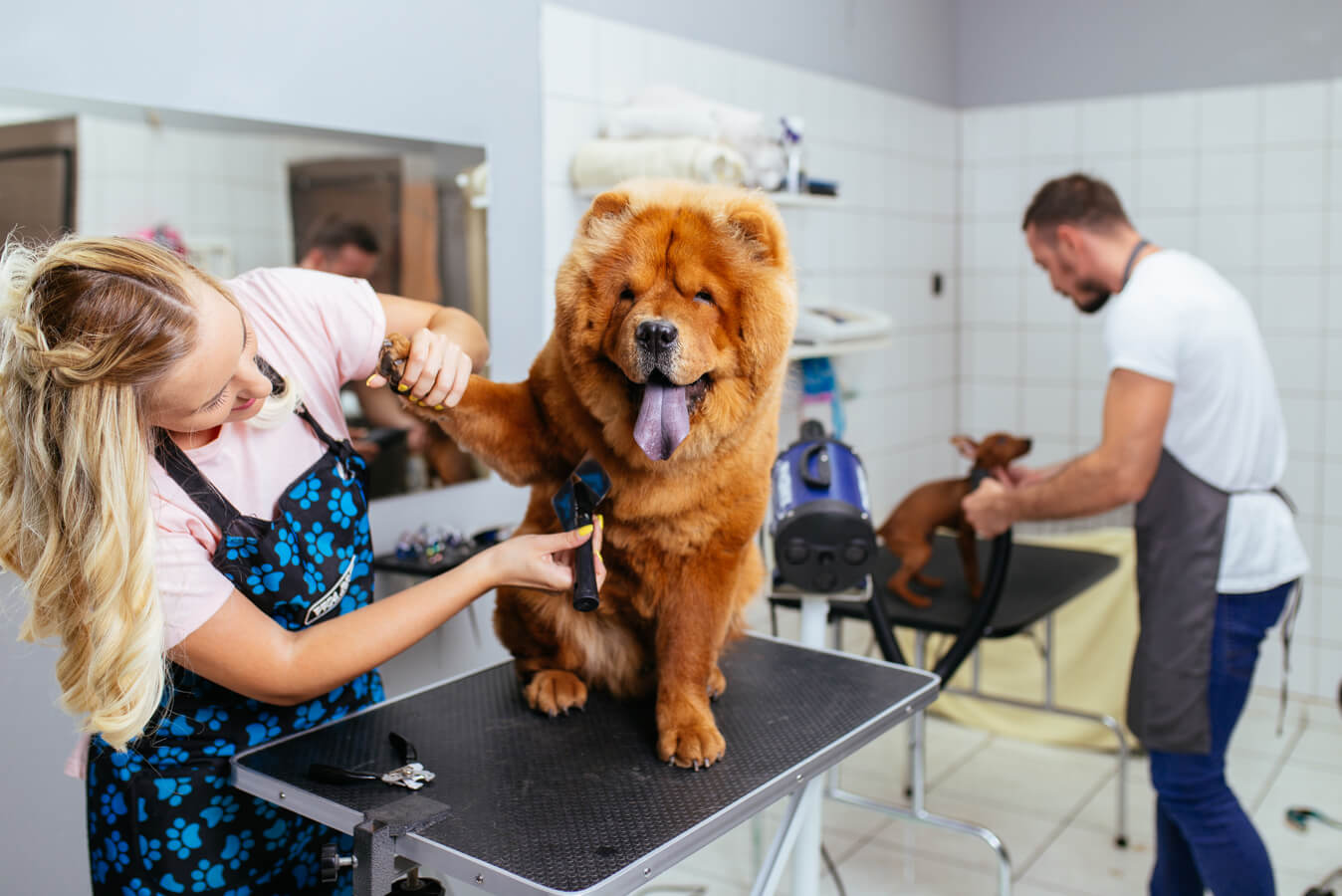If you’re a professional dog groomer, you know how important your grooming shears are to the success of your business. Grooming shears are the one tool that can turn a shabby-looking coat into a chic coat! Knowing how to choose and care for dog grooming shears is just as important as the other essential parts of your pet-care business like the software you use, your employees and your website.
Ineffective or poorly cared for shears can result in shaggy cuts, poorly executed grooming jobs, longer appointment times and, ultimately, unhappy customers.
To help you select and maintain the quality of your grooming shears, we’ve put together this handy guide.
- Choosing the Best Grooming Shears: 4 Considerations
- Caring for Your Dog Grooming Shears: 5 Steps
Choosing the Best Grooming Shears: 4 Considerations
1. Consider the Different Types of Grooming Shear
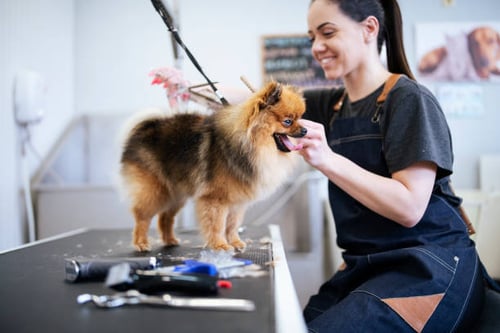 Your busy dog grooming business serves pups of all breeds, sizes, coat lengths and body types. To meet the needs of all your furry clients, you will need to have a few types of shears on hand.
Your busy dog grooming business serves pups of all breeds, sizes, coat lengths and body types. To meet the needs of all your furry clients, you will need to have a few types of shears on hand.
Straight shears for clean and precise lines.
Straight shears are most often used on dogs with defined coat patterns, like poodles. To keep a curly coat neatly trimmed with even lines, you will need a pair of straight shears. Sensitive areas such as a dog’s paws, face, ears and tail, require a precise cut that only straight shears can provide.
Curved shears for style with shape.
Curved shears come in several blade lengths, depending on the size of the dog you’re grooming. These rounded shears are used to add angles or shapes to a dog’s coat and work well on coats with frizzy textures. A great example of this would be the adorable round “poof” that frames a bichon’s head. You can even find “extra” curved shearing blades for more extreme angular cuts.
Thinning shears for improved texture.
Thinning shears serve a few purposes: they can blend hair that has been clipped into hair that has been scissor cut, and the toothed blade will help thin a dog’s coat at the root so that it lays nice and flat. The “beveled blades,” of these versatile scissors work on most types of dogs to quickly thin out a thick, unruly coat.
Knowing which dog grooming shears to use on which coat will ensure you give the perfect groom job for every pup that your pet-care business serves, no matter their size or coat type.
2. Choose the Right Edge for Your Needs
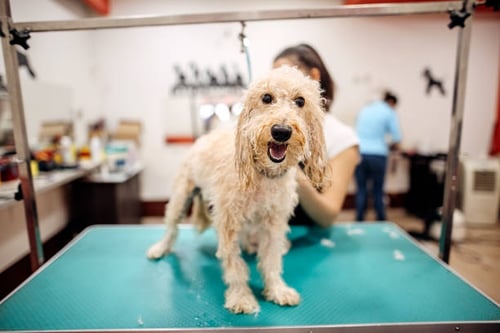 There are many dog grooming shears on the market, but they all fall into two main types of blade edges: beveled and convex. Choosing the right edge will depend on the thickness of the dog’s coat and the hair length.
There are many dog grooming shears on the market, but they all fall into two main types of blade edges: beveled and convex. Choosing the right edge will depend on the thickness of the dog’s coat and the hair length.
Beveled blades.
Beveled-edged grooming shears, sometimes called German-edged shears, are built to groom dogs with thicker coat hair. These blades are not as sharp as convex blades, but they’re incredibly durable. Small grooves in the blade act to hold strands of fur in place while the groomer works their magic. German-edged shears are excellent at removing a lot of hair quickly and thinning thick hair.
Convex blades.
Convex blades are designed with a smooth edge to provide an extremely accurate cut. These blades are the grooming tool to use when you’re putting the finishing touches on a pup’s coat. The sharp, precise edge of convex blade shears allows groomers to create incredibly smooth, flawless cuts.
One more thing to keep in mind when you’re selecting your shears. Don’t forget to consider the length of the blade. How long your shears are makes all the difference when working on different-sized dogs. The grooming scissors you use on a big fluffy Newfoundland will differ from the shears you use on a petite corgi.
3. Evaluate Tension Adjustment Capabilities
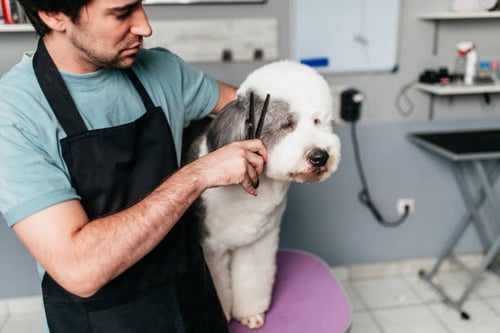 Grooming shear tension is the tension on the screw that holds the blades together. A shear’s tension determines how widely the blades open. Busy dog groomers know all too well that the more you use your shears, the more tension they lose. The level of tension each groomer finds comfortable comes down to preference, but there are a few guidelines you should follow.
Grooming shear tension is the tension on the screw that holds the blades together. A shear’s tension determines how widely the blades open. Busy dog groomers know all too well that the more you use your shears, the more tension they lose. The level of tension each groomer finds comfortable comes down to preference, but there are a few guidelines you should follow.
Make the scissor opening wider for longer coats. Be mindful of loosening the screw too much when opening the blade for coats like these. If you don’t return the tension of the shears to its proper level after working on a long coat, you may believe your blade has dulled when you begin working on the next client.
Narrow the scissor opening for shorter, stubborn fur. Having more tension on the blade will help a groomer work through stubborn fur, or get a closer cut on a pup with a shorter coat. If the blade is too tight over an extended period, you may start to dull the blade from overuse.
4. Prioritize Comfortability and Weight
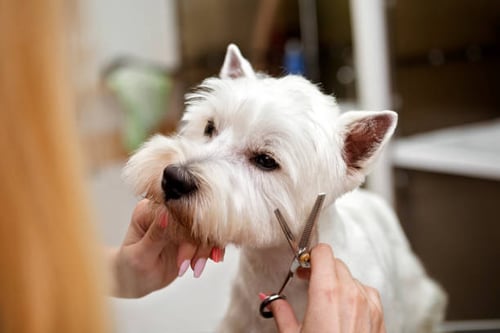 Professional groomers use their hands all day long. Not only that, but they are holding and gripping a small piece of equipment within a limited range of motion. This wear and tear on the body mean that it is crucial to use a comfortable pair of shears.
Professional groomers use their hands all day long. Not only that, but they are holding and gripping a small piece of equipment within a limited range of motion. This wear and tear on the body mean that it is crucial to use a comfortable pair of shears.
When selecting your next pair of dog grooming shears, look for a light, ergonomic design. This will help keep your hands happy - and healthy down the line. While these shears may be a bit more expensive, the level of comfort they provide is well worth it.
Shears should be:
- Lightweight and easy to hold. A lighter-weight shear will prevent your hand from becoming fatigued if you groom for long periods.
- Comfortable. Look for features like padding and large loops that allow you to adjust for awkward angles. A comfortable grip means less stress on your fingers.
Look at the available specs, and reviews, and test the shears in person, if you can, before making a purchase.
One of the great things about professional dog grooming shears is that manufacturers have models for both right-handed and left-handed groomers. Using scissors that are designed for your dominant hand can make all the difference in how comfortable you are as you work through a dog’s coat.
Caring for Your Grooming Shears: 5 Steps
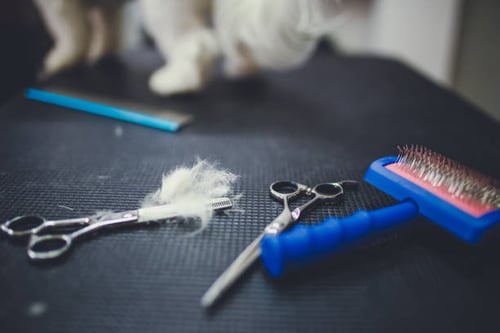
Grooming shears are a big investment, so it's important to know how to care for these hardworking tools. The better you take care of your grooming scissors, the longer they will last and the happier your clients will be when they leave their grooming appointment.
Here are five easy steps to maintain your grooming shears.
1. Remove hair and fur.
The most important step to caring for dog grooming shears is cleaning them after each use. Hair and fur debris can cause rusting if it remains on the blade after use. Simply use a clean, wet cloth to wipe the blades when you’re done.
2. Dry the shears.
After you’ve wiped the shearing blades, take a dry cloth and remove any excess liquid. Just like pieces of fur, any residual water can result in rust damage. Some dog groomers keep one cloth for wiping and one cloth for drying.
3. Apply shear lube.
Purchasing a high-quality shear lube made of gentle solvent and silicon for your grooming tools is a valuable investment. Regular lubrication ensures that mechanical elements stay in place and prevent rust.
4. Open and close shears.
After you apply the shear lube, open and close the scissors for about thirty seconds to disperse the lube across the blades.
5. Store your scissors properly.
When not using, store your shears in the closed position within a case. This will prevent debris from getting on your perfectly cleaned shears so they’re ready for the next grooming client.
To get the most use out of your dog grooming scissors, clean the blade thoroughly at the end of every day and between each appointment. You can build a few minutes of cleaning time between appointments by using the scheduling feature in your Gingr dog grooming software so that each client appointment begins on time and with a clean pair of shears.
Wrapping Up
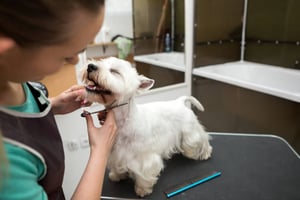
Grooming shears for dogs are an essential piece of equipment for pet-care professionals. Selecting and caring for your shears is an investment in your business and one that will help you provide the best service to your four-legged clients. But good dog grooming tools are just one piece of a successful business. Managing appointments, quickly creating invoices, and using online bill tools is a cinch when you use Gingr’s pet-care software. These digital tools will automate so many tasks, save employees and customers time, and give you the digital know-how that your business needs to thrive in a competitive industry.
Additional Resources
Follow these resources to learn how to choose and use the many other tools made for groomers and pet-care providers.
- 5 Pet-Care and Dog Grooming Industry Trends: Market Report. Understanding where dog grooming industry trends are headed will help pet-care businesses make strategic decisions and adapt to market changes. Learn more in this industry trend market report.
- 10 Pet-Care Business Marketing Tips That Deliver More Customers. Standing out from the crowd can be challenging in an industry as competitive as pet care. These tips for elevating your internet marketing strategy are here to help.
- 9 Top Pet Grooming Tools Recommended by Professionals. Using the best pet grooming tools isn’t just good for the pets in your care, it's good for business. Check out which tools professional pet groomers give two paws up to.



